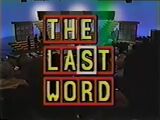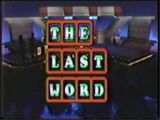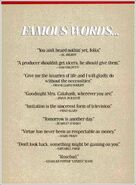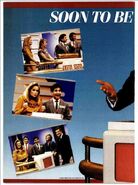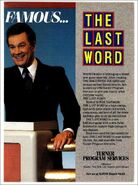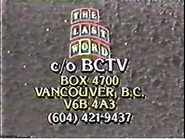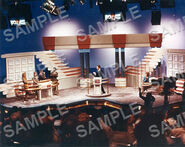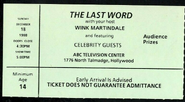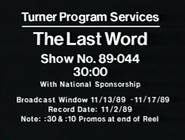| Host | |
| Wink Martindale | |
| Hostesses | |
| Jana White (1988) Jennifer Lyall (1989) | |
| Announcers | |
| Burton Richardson (1988) Jennifer Lyall (1989) | |
| Broadcast | |
| Pilot: 12/18/1988 Syndication (Daily): 9/18/1989 – 12/15/1989 (with reruns through 1/5/1990) | |
| Packager | |
| Merrill Heatter Productions | |
| Distributor | |
| Turner Program Services | |
The Last Word was a word game where a group of words share a common bond, and where the last word means everything.
Gameplay[]
Two teams consisting of a celebrity and a civilian contestant competed to guess a series of groups of words that had something in common in order to win prizes. The civilians received all winnings credited to their teams. Among the celebrities who appeared include Jill Whelan, Ted Lange, Susan Ruttan, and Gordon Jump.
Main Game[]
To start, a puzzle consisting of three rows of blank squares (indicating how many letters were in each word) was revealed along with three free letters (one in each row). The player in control pressed a button which caused a yellow square to move around the board. When it landed on an empty square, a letter in that square was revealed and then the player had to decide to either take a guess on any word in any row or pass control to his/her opponent (that player also had the option to guess at the start of a turn); but if the yellow square landed on a square that already had a letter revealed, then the player had to choose which row & square in which to reveal a free letter.
When guessing the word, if the player guessed correctly they won that word; but if he/she guessed wrong, the computer typed in, from left to right, the letters that were correct (up to the first incorrect letter), except for the last letter, which remained hidden. After making a correct guess, he/she had the option to either guess another word or pass control. The first team to guess the last word in the group of three won the game. If they had solved only the last word, they won a rather cheap prize; two words won a better prize, and solving all three words and winning the game won the first two prizes & a bonus prize for that game. A game win was signified by a star lit up on the team's podium. A best two-out-of-three match was played with the winning team becoming champion and advancing to the bonus round.
Unlike most celebrity-civilian word games, the arrangement of which people played in each game varied. In the first two games, the celebrity from one team competed against the civilian player from the other team. In the tie-breaker, both civilian players competed.
If time ran out in the middle of a puzzle, all the words were revealed and a new puzzle was played at the start of the next episode.
Bonus Round: 60-Second Challenge[]
In the bonus game, the winning team had 60 seconds solve 10 puzzles. Each puzzle had two words already revealed, they acted as clues to the third word, which was unrevealed (one letter was given at the outset). Letters in the mystery third word were revealed one at a time in random order (the last letter was not given) (similar to Scrabble’s Speedword). Each correct answer was worth a $100 gift certificate, but solving all ten puzzles won a jackpot grand prize package (which usually included a trip). Should that not occur, more prizes were added until won. The highest jackpot won during its short run was $46,500.
After the bonus round, both players switched celebrity partners for each new game, and the first player to win two matches became the champion and remained on the show to face a new challenger, competing until they were defeated or played six 60-Second Challenges, whichever came first.
Pilot Rules[]
The pilot was similar to the series, but it had several differences:
- The pilot was taped in Los Angeles, CA while the series was taped at BCTV in Vancouver, BC.
- There was a different hostess named Jana White who worked the computer and the announcer was Burton Richardson.
- Players stopped the square which was white with the use of a lever instead of starting the yellow one by hitting the button.
- Words were worth a straight-up $100 cash win or lose, so one player could win up to $300 per game. $100 cash per word was also offered in the 60-Second Challenge instead of just prizes; meaning that winning the bonus was worth $1,000 and a jackpot prize package.
Stations[]
Stations that aired this included:
Dallas/Fort Worth - KDAF
Cedar Rapids - KOCR
Des Moines - KDSM
Portland, OR - KPDX
Los Angeles - KTTV
Green Bay - WXGZ
Chicago - WFLD
New York - WNYW
Philadelphia - WGBS
Baltimore - WBFF
Washington D.C. - WTTG
Albuquerque - KLUZ
Minneapolis - KMSP
Sacramento - KSCH
Greenville, SC - WYFF
Charlotte - WCNC
Greensboro - WXII
Norfolk - WTVZ
Denver - KMGH
Detroit - WXON
Huntsville, AL - WZDX
Trivia[]
Tony Reitano, one of the contestants from the pilot, would later appear in the 1990 Gambit pilot (another Merrill Heatter game show) and an episode of Jumble: The Interactive Game. Back in 1981 and before appearing on the pilot, he was one of the two top winners on The $50,000 Pyramid.
Additional Page[]
Rating[]
Music[]
Michael Camilo for Score Productions
Sound Effects[]
The sound when a letter was revealed was the Fast Money answer reveal sound in Family Feud; also, the sound heard if the cursor stopped on a letter already given was the ring-in sound from Family Feud as well.
Gallery[]
Trade Ads[]
Contestant Plug[]
Set Pic[]
Tickets[]
Production Slate[]
Links[]
YouTube Videos[]
Pilot Episode
Preview Episode featuring Jamie Farr and Michele Scarabelli
Series Premiere featuring Ted Lange and Jill Whelan of The Love Boat
Meredith MacRae and Peter Marshall
June Lockhart and Dick Van Patten
Contestant Rich Bowen
Pat Harrington Jr. & Edie McClurg
